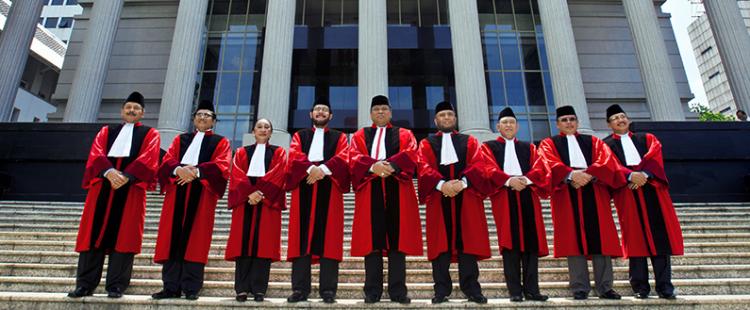Inconsistency of the Constitutional Court on the KPK Inquiry

On 8 February 2018, the Constitutional Court pronounced its ruling on the request for judicial review submitted by KPK employees, in question of the validity of the House of Representatives’ invocation of its inquiry rights pertaining to the KPK (Corruption Eradication Commission), herein after ‘KPK Inquiry’. With Decision No. 36/PUU-XV/2017, the Constitutional Court declared that the KPK Inquiry is valid. The Court rejected the argument of the plaintiff that the KPK Inquiry was in violation of Article 79 paragraph (3) of Law No. 17 of 2014 on the MPR, DPR, DPD and DPRD (MD3 Law).
The public was stunned by the Court's decision, not only because of the dissenting opinions of four of the nine judges, but because the ruling inconsistently placed the KPK as part the executive, while previous decisions have always placed the KPK not as part of the executive. These previous verdictsare verdicts on cases number 012-016-019/PUU-IV/2006, 19/PUU-V/2007, 37-39/PUU-VIII/2010, and No. 5/PUU-IX/2011, asserting that the Commission is an independent institution that is not within the realm of the executive, legislative, or judicial bodies.
In the midst of the current crisis of integrity in the Constitutional Court, the inconsistency of the Constitutional Court's verdict raises the public's suspicion that there is a political interest in the KPK Inquiry verdict. As is known, Arief Hidayat, the Chief Justice of the Constitutional Court, has been subject to a second sanction from the Council of Ethics and Honor of the Constitutional Court for violation of the Code of Ethics of Judges Guidelines and Behavior (KEPPH), having met with the leadership of the House of Representatives Commission III before his re-nomination as Chief Justice of the Constitutional Court. Although the political lobbying cannot be proven, attending an invitation based on a phone call is considered not conventional in state institutions.
Currently there is a strong wave of demands for Arief’s resignation. A total of 54 professors from several universities have urged him to resign from his position. Previously, the Chair of the Law and Human Rights Section of PP Muhammadiyah Busyro Muqoddas, along with STHI Jentera academic Bivitri Susanti and Director of Anticorruption Madrasah of Muhammadiyah Youth have also demanded the similar thing. Even Arief Hidayat’s own alma mater Airlangga University (UNAIR) has created a petition and planned to send him a letter urging him to resign, having been disappointed in Arief who cannot perform his duties in a professional manner.
In the midst of the counterattack against corruption eradication, the Constitutional Court's verdict is of course highly disadvantageous to the KPK, since KPK’s every move can be inquired by the House of Representatives, which is likely to hamper the handling of legal proceedings. This reflects the creation of the KPK Inquiry committee, based on the House’s demand to the KPK to surrender the evidence of recording of Miryam S Heryaniin the e-KTP case.
However, the Constitutional Court's decision on the DPR's right to inquire the KPK is a legal fact, which the KPK must be ready to face. The public should also not be silent, guarding every implementation of the right of inquiry to ensure that it does not interfere with law enforcement in corruption cases.
In addition, all elements of society, civil society organizations, academics, professional associations and others must continue to urge the Chief Justice of the Constitutional Court, Arief Hidayat to resign from his position as part of his ethical responsibility to safeguard the dignity of the Constitutional Court. The cases of the previous Chief Justices of the Constitutional Court Akil Mochtar and Patrialis Akbar have resulted in the fall of the image of the Constitutional Court to its nadir, and therefore the Council of Ethics should apply a high moral and ethical standard for every judge who violates the honor of the institution. (Snyt)










